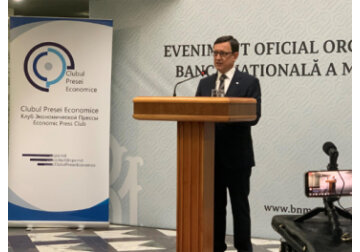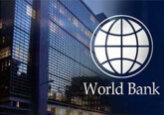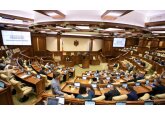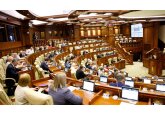
The NBM increased the base rate applied to main short-term monetary policy operations by another 3 percentage points from 15.5% to 18.5% per annum.
Governor of National Bank of Moldova (NBM), Octavian Armasu, said at a Friday press conference that the NBM Executive Committee adopted this decision at a meeting on June 3. Also, the interest rates on overnight loans and deposits were increased by 3 percentage points from 17.5% to 20.5% and from 13.5% to 16.5% per annum. At the same time, there is envisaged a gradual increase of required reserves from funds attracted in MDL, as well as in convertible and non-convertible currency. It was particularly agreed that required reserves from funds attracted in MDL and non-convertible currency will be increased by 2 percentage points for the period of June 16 to July 15 - from 30% to 32% of the calculation base, and in the period of July 16 to August 15 - by another 2 percentage points - from 32% to 34%. At the same time, the rate of required reserves on borrowed funds in freely convertible currency will be raised by 3 percentage points from June 16 to July 15 - from 33% to 36% of the estimated base, while during the period of July 16 to August 15 it will be increased by another 3% from 36% to 39% of the calculation base. Governor of the National Bank of Moldova, Octavian Armasu, said that the risks and uncertainties related to stability of consumer prices are high, which is the reason for maintaining restrictive monetary policy. According to him, the adopted monetary policy measures are timely from several points of view. They are related to mitigating the effects of the second round of external price shocks, balancing aggregate demand, encouraging savings over immediate consumption, and easing pressure on national currency depreciation due to an increase in the current account deficit and capital outflows. Octavian Armasu specified that the monetary policy promoted by the NBM creates monetary conditions that can mitigate high rates of consumer price growth and the side effects of supply shocks. Thus, the NBM seeks to anchor inflation expectations and return inflation to the target of 5% (±1.5 p.p.). According to him, regional and global economic conditions are still affected by the situation in Ukraine and related risks and uncertainties, respectively. Inflation in the world grew at an accelerated rate, driven by: the continuing growth of quotations on the international markets of raw materials, food and energy resources, as well as failures in the supply, production and transportation chains. In this environment, central banks revised their inflation forecasts upward for the coming quarters and responded by maintaining an anti-inflationary monetary policy. As the head of the NBM noted, the regional and international context unbalances the domestic macroeconomic situation and puts pressure on inflation through the import channel. Compared to other countries, Moldova has a higher dependence on quotations and events on international markets, which makes our country even more vulnerable to price shocks. Referring to inflation, Octavian Armasu stressed that its annual rate rose from 22.2% in March to 27.1% in April, because of a number of overlapping factors. Besides the import component, an important factor of inflation is the delayed adjustment of regulated tariffs. At the same time, the tense situation in the region and the risks of its escalation maintain uncertainty regarding the medium-term inflation forecast. The factors that will determine the dynamics of inflation in the future will continue to be imported energy and food prices. The latter will probably replace goods from Ukraine, and the corresponding pro-inflationary effects will activate supply factors through production costs. The prospects for GDP growth in the medium term depend on the course of the war in Ukraine, the accompanying risks and uncertainties. In this sense, factors that may affect the consumption of the population are identified. On the one hand, there is a pro-inflationary impact of demand from refugees, and on the other hand, a disinflationary impact in terms of reduced sources of financing consumption related to the receipt of remittances. Against the background of disruptions in supply chains and foreign trade logistics, the trend of substitution and restructuring of sectors of the economy persists. Due to the rise in prices for mineral fertilizers and energy resources, agrarians have to bear high costs, which creates prerequisites for a decrease in agricultural activity this year and for the preservation of a high level of food prices. The monetary conditions, adjusted by the restrictive nature of the current monetary policy, remain favorable to support savings, attractiveness of deposits and, at the same time, weaken the consumption of the population, as well as consumer lending, which warms up the economy and feeds inflationary pressures. According to the NBM Governor, recent analyses show an increase in interest rates on new loans in local currency and a corresponding decrease in lending rates, which eases the pressure on inflation. Although rates on new deposits attracted in the national currency continue a progressive dynamics, there is a restraint of depositors amid the uncertainty of the development of the armed conflict in the neighboring country. However, weekly data show an upward trend in the volume of new deposits attracted in MDL, after its decline in March. Octavian Armasu noted that global, regional and national risks and uncertainties are amplified by the consequences of the military conflict in Ukraine, and prospects for economic conditions in the context of these events are unreliable. Analysis and assessment of available macroeconomic information, after elaboration of the forecasting round in April, signals about preservation of the risk of deviation from the medium-term forecast of the progressive inflation growth on the whole horizon of the forecast, except for the second quarter. External assumptions related to lower global economic activity and higher global oil and food prices relative to expectations in the May Inflation Report served as the basis for assessing the risk of deviation. In addition, the pro-inflationary impact will have risks from the domestic conjuncture, associated with possible actions of the authorities to support the population and economic agents in subsequent periods, as well as adjustments to regulated tariffs. The head of the NBM explained that the Executive Committee's future decisions on monetary policy will depend on the evolution and prospects of medium-term inflation, the monitoring and risk assessment of the internal and external environment. The next meeting of the Executive Committee of the NBM on monetary policy promotion will take place on August 8, according to the approved schedule. // 03.06.2022 - InfoMarket.







